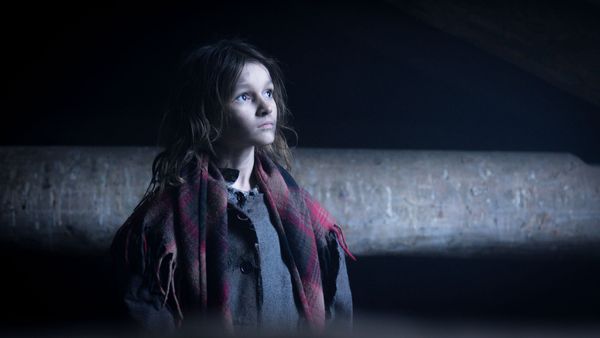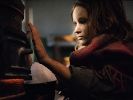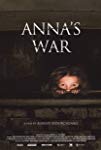Eye For Film >> Movies >> Anna's War (2018) Film Review
Anna's War
Reviewed by: Amber Wilkinson

Russian director Aleksey Fedorchenko isn't the first to try to come at the horrors of the Holocaust from a fresh perspective - although the narrow outlook he adopts here also ends up limiting how much he is able to say.
His film - co-written by Nataliya Meshchaninova (Arrhythmia, Core Of The World) - is seen almost entirely from the viewpoint of Jewish six-year-old Anna (Marta Kozlova). After her family are murdered by the Nazis during the opening moments of the film, she is left for dead among the bodies - in one of the many visually striking moments, captured with a stark grace by Alisher Khamidkhodzhaev. She isn't alone for long and soon finds herself carted off to a school that has been converted into a soldiers' base. Here, after a spot of quick thinking, she manages to trick them into believing she has escaped and hides herself instead up a chimney in one of the schoolrooms. From there, she can watch, via a damaged mirror some of the daytime comings and goings while, at night, she slips out to scavenge what she can from the rest of the building.

What follows is a struggle for survival, told as a series of vignettes that each fade to black - a dislocating move that underscores the sense of time passing in random ways to Anna but which nevertheless hampers the flow of the film. To begin with, it looks as though the little girl might not last the week, with no food or water, but she proves to be resourceful in a way that always feels believable, hunting down a means of survival but without us losing any sense that we are watching a young child. Kozlova has a haunting quality and commands the film impressively given that she barely makes a sound throughout - conveying her feelings through actions, instead, such as the befriending of a stray cat.
The film - which was named best film at the Russian NIKA Awards (one of two rival awards vying to be the 'Russian Oscars') - might have worked better as a story targeted more towards younger audiences, who could have used it as a springboard for discussion on the war, alongside the likes of the Diary Of Anne Frank, with many of Anna's ideas, such as how to trap a meal or keep warm, proving ingenious. Fedorchenko's unremittingly downbeat approach, however, seems to have a more adult audience in mind - but he never quite makes the leap from the, admittedly excellent, smaller details, to the bigger intellectual picture.
Reviewed on: 01 Apr 2019















